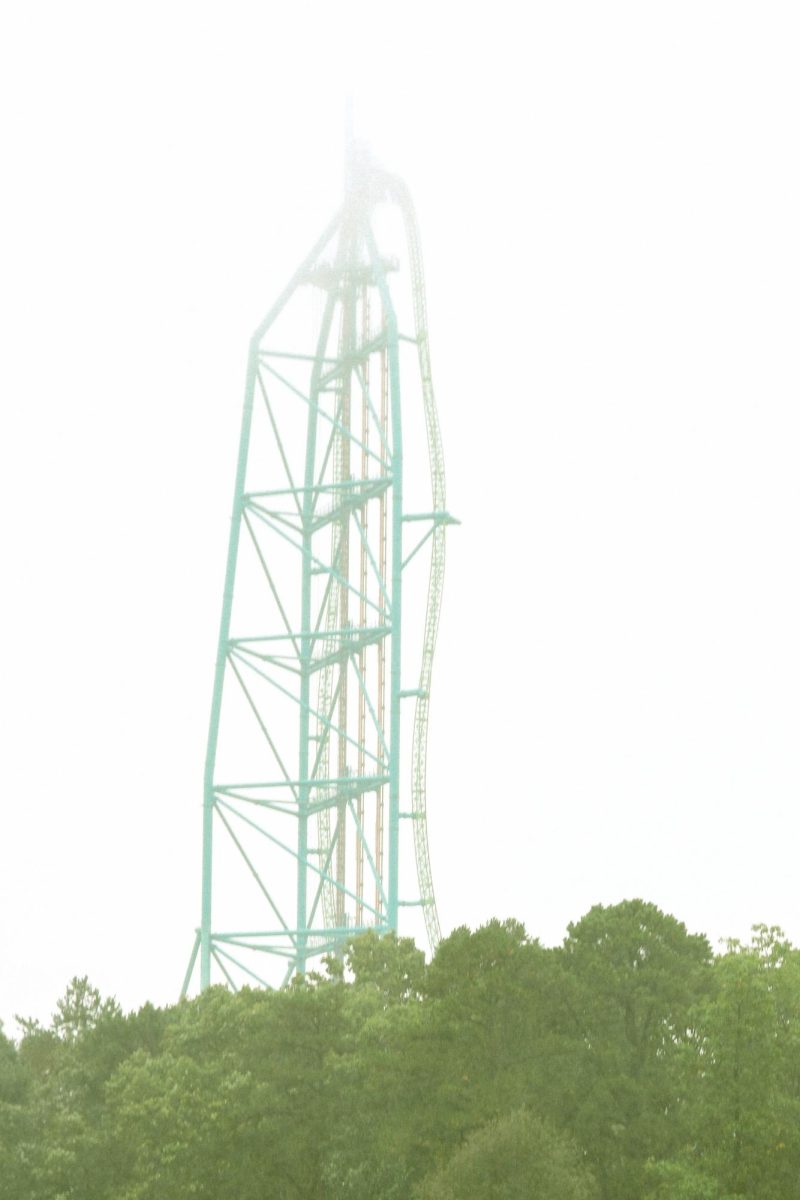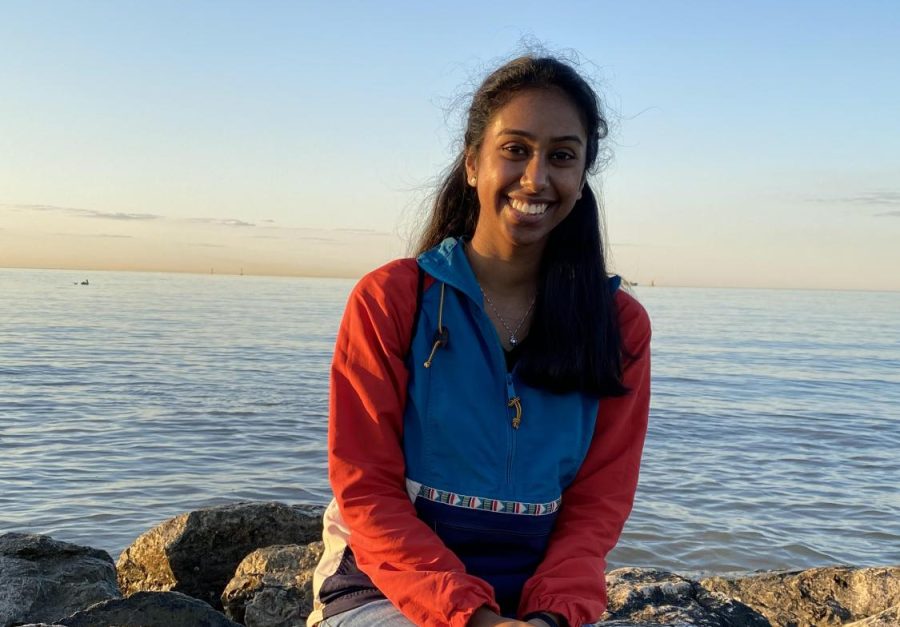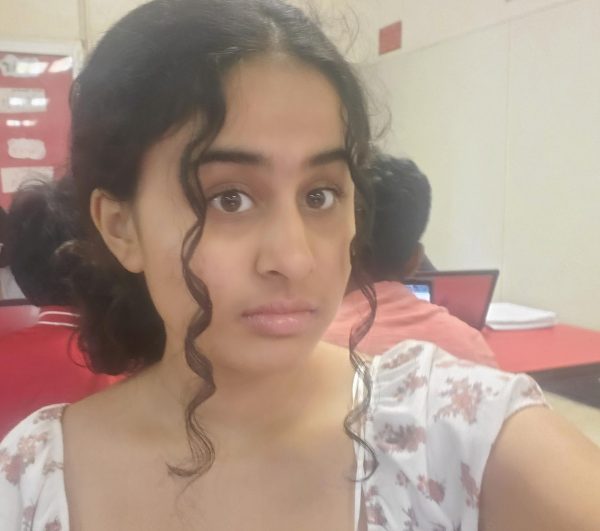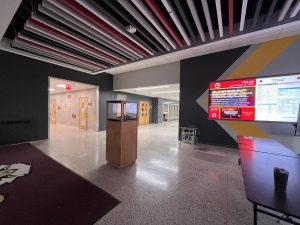A Call From Eagles Out of the Nest: Neethu Pottackal
Neethu Pottackal at the beach.
June 8, 2022
A bright mind both in and out of Edison High School, Neethu Pottackal ‘16 has attained great success. During her senior year, she was president of the National Honors Society while being a member of the Tri-M Honors Society, Science National Honors Society, and the Spanish National Honors Society. Pottackal also held positions in many other activities, such as the Wind Ensemble, Rotary Club, and Model United Nations. Her achievements do not stop there. She also won a multitude of academic awards, such as the AP Scholar award and the NJ Governor’s STEM Scholar Award. Moreover, she even won multiple art awards; in particular, National Grand Prize Winner of Art Smart Challenge. Pottackal is also musically inclined, and she went to multiple music camps during her time at EHS. Her talents and hard work were awarded when she got accepted into Cornell University, College of Engineering. She completed her Bachelor’s of Science in Materials Science and Engineering in May of 2020. Currently, she is at Rice University for her PhD in Materials Science and Nanoengineering.
EE: What do you miss about EHS? What about Cornell?
NP: Well, I miss a lot of things. I think the community is the first. Everyone at EHS comes from diverse backgrounds and you get to learn a lot about the world through that. The faculty and staff are very supportive and have helped shape me into the person I wanted to become. In terms of Cornell, it’s kind of the same. It’s the people, such as my friends, my Materials Science and Engineering department and classmates as well as my research professor, that have made a huge difference. You do college life together with your classmates, so you build memories and lasting friendships through that. So, the people are what makes each place special. I’m grateful that I went to EHS and it still holds a special place in my life.
EE: Did you take any classes at EHS that would influence your decision to get into materials science and nanoengineering later on? Or, did you have any moments in high school where you felt like this field was your calling?
NP: I already knew I wanted to be a scientist/engineer, but I didn’t really know what kind of science or engineering. So, I focused more on the science and math classes, but I enjoyed many other classes like English, Spanish and history. I believe non-STEM courses are also essential and people underestimate their importance. When I got to college—and even grad school right now—being able to write and speak well is crucial. In a way, all the skills you learn at high school will help you at one point or another. Something I wish I learned more of was coding, but even if you don’t get to try everything you want in high school, you can expand on those skills in college. I was also a part of the Wind Ensemble for all four years of high school, and I was very passionate about music at the time. My experiences in band helped me as well in my career such as in developing leadership skills and self-discipline. So, you don’t have to take only tech, math, or other STEM-related classes. Taking classes that you are curious about or outside your career interests can help shape the person you want to become.
EE: Where did you derive motivation from in high school? How did you learn to lift yourself up whenever you, figuratively, fell down?
NP: To be honest, I’m still learning how to do that. I believe learning to find motivation and resilience is something you keep learning and working on. In high school, a lot of my motivation came from my family, classmates and teachers – many of the cool things they did would inspire me as well. Exploring opportunities outside of high school, like conferences whether that be band or STEM, also made an impact as well. Going outside your comfort zone and putting yourself out there in diverse environments helps you learn about a lot of different people and how they stay motivated. There were definitely moments where I felt like I wouldn’t do well in a class or I doubted myself. During those times, I would recommend reach out to your support system and not to be afraid to ask for help. Maybe that means talking to your teachers and your peers to see how you can make improvements, no matter how big or small. I also talked to my senior classmates who would give me great advice. So finding motivation and support from your friend circle, mentors, and family has helped me a lot. Most importantly, know that growth and progress take time – take it day by day, every small positive step makes a difference.
EE: What were some of your favorite courses in high school, or courses that were useful to you later on in life?
NP: I found the combination of all the courses – English, math, science, band, etc. – to have made a big impact and all the departments are very strong at EHS. Two courses that particularly stand out are the language classes and AP Statistics since they are useful regardless of the field or expertise. In general, I would say to find ways to enjoy as many courses as you can – they all come to use in different ways whether that’s related to personal and/or career development.
EE: Name a few figures throughout high school, college, and/or your life that have inspired you.
NP: Mr. Ross has always been an inspirational mentor and principal. He puts in time and dedication for his students. He looks out for each person, regardless of who they are. Try to get to know Mr. Ross and all your teachers, whether that be learning from their career and/or personal advice and experiences.
EE: What is the biggest piece of advice or lesson that you received through your EHS experience?
NP: Your performance in high school affects your future, but if something doesn’t go as planned, it’s not the end of the world. Strive to work hard and be kind to yourself and the people around you. Nothing’s permanent whether that be success or failure. In high school, I was very focused on doing well in my classes and having a great record for everything. But in college, it’s more about finding what interests you and having the courage to always push forward for your passion. My classmates have succeeded in their own unique ways and thrive in their own environments, whether that be as a musician, artist, entrepreneur, or doctor. It’s really inspiring to see how everyone finds their own path and journey. EHS prepares you well whether that be through the friendships you make or the classes you take, so don’t be afraid to go out there and chase your dreams.
EE: How do you handle stress and academic lows? Do you think your perceptions of these topics have changed over time?
NP: I think I’m still figuring that out, but prioritizing is definitely important. Some colleges have so many applicants that are doing just as well as you are, so it’s kind of hard to stand out sometimes. I think it’s more important to focus on yourself, even if it’s just taking one step at a time, and not to compare yourself with others. Sometimes there are going to be low points where things seem difficult and doubtful and other times it’s going to be those high points with multiple goals achieved. I would say it’s important to embrace both. I went through a difficult time in college, both academically and personally. It was during this time that I became very interested in combining food technology and material science Sometimes, you learn most about yourself or realize what you’re most passionate about during challenging experiences. The number of times you fall don’t define you but how many times you are willing to get up and try again.
EE: What do you wish more people knew about materials science and nanoengineering? How do you hope to educate more people about the benefits of your field?
NP: It’s an up-and-coming field, and not many people know about it. The reason I knew about it was because I had friends in that field. If you’re interested in engineering, try out programs that go through the different types of engineering or science fields – there is a lot to explore. Materials science and engineering is very interdisciplinary. It essentially about working on a material at either a macroscale or a nanoscale and tweaking its composition or structure so that it performs better. Materials science is useful and important to a variety of fields including, but not limited to, energy storage, medicine, structural applications as well as agriculture. It’s a field that combines all three sciences – chemistry, math, and physics. I was really interested in Materials Science and Engineering because of its interdisciplinary and broad nature. Currently, I’m passionate about using my materials science and engineering background to find innovative and sustainable solutions for food and agriculture problems, such as food waste. I hope to educate more people about my field through research and STEM outreach as well as my interests in entrepreneurship.
EE: Finally, what advice would you give to the students here at EHS? What advice would you give to students who also aspire to go to an Ivy League university?
NP: Take advantage of as many opportunities at EHS as you can. A lot of things that you least expect can end up making a big difference in your life and they may even pivot your career aspirations. Personally, Model UN was one of these examples – I wasn’t sure if I would be interested but it was an awesome experience and helped me with public speaking and networking skills. Don’t be afraid to give something a try if you’re interested or curious. You never fail from trying. Another piece of advice is to embrace the community at EHS. A lot of people bring in a lot of insights, whether it be cultural or social, and you learn a lot through the friendships and connections you make. Get to know as many people as you can and enjoy your time at high school. As for students aspiring to go to an Ivy league, there are lot of components to it and there is no clear-cut formula. Every year, I would have a list of goals that I hoped to accomplish. I would recommend trying to do as well as you can in your classes and to take challenging courses. Sometimes you won’t do so well, but improvement and consistency in effort matters. And no matter what school you aspire to get in, try to talk to senior students and/or alumni who went through the process to get useful tips. The last and probably the most important thing advice is that getting into or going to an Ivy League school doesn’t determine how successful or unsuccessful you’ll be – it has its advantages, but it doesn’t determine your sense of worth. There are so many amazing colleges out there with great programs and communities and I would say that you should emphasize on finding the college that fits you. It’s not just about the name. It’s also about what’s the best for you.
Know an Eagle out of the nest who has a story to tell? Email contact information to [email protected].
























































































